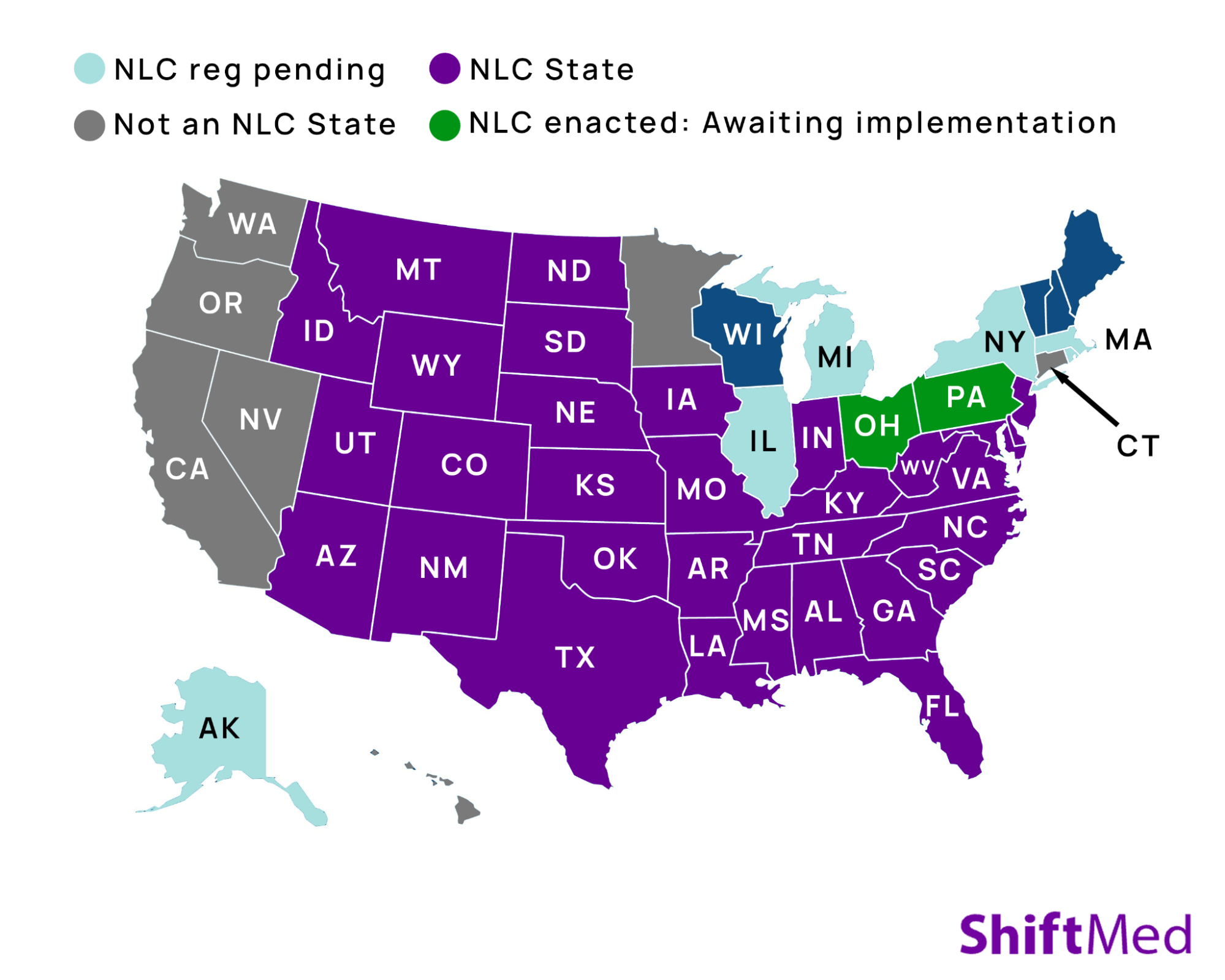Navigating the Nursing Compact: A Comprehensive Guide to Interstate Practice
Related Articles: Navigating the Nursing Compact: A Comprehensive Guide to Interstate Practice
Introduction
With enthusiasm, let’s navigate through the intriguing topic related to Navigating the Nursing Compact: A Comprehensive Guide to Interstate Practice. Let’s weave interesting information and offer fresh perspectives to the readers.
Table of Content
Navigating the Nursing Compact: A Comprehensive Guide to Interstate Practice

The nursing profession, characterized by its commitment to patient care, often demands flexibility and mobility. This is particularly true in the United States, where a diverse landscape of healthcare needs and employment opportunities necessitates a fluid system for nurses to practice across state lines. The Nursing Licensure Compact (NLC) addresses this need, offering a streamlined approach to interstate nursing practice. This article delves into the intricacies of the NLC, providing a comprehensive understanding of its structure, benefits, and implications for nurses.
Understanding the Nursing Licensure Compact
The NLC is a collaborative agreement among participating states that allows nurses licensed in one member state to practice in any other participating state without the need for separate licensure. This eliminates the cumbersome process of applying for individual state licenses, saving time and resources for both nurses and employers.
The Map of Compact States
The NLC is not a nationwide agreement. It is a dynamic system, with participating states constantly joining or withdrawing. The map of compact states is a visual representation of the current NLC membership. This map is crucial for nurses seeking to practice across state lines, as it clearly identifies the states where they can utilize their compact license.
Benefits of the Nursing Licensure Compact
The NLC offers a range of advantages for nurses and the healthcare system:
- Increased Mobility: Nurses can readily practice in multiple states without the hassle of separate licensures, facilitating career growth and geographical flexibility.
- Enhanced Recruitment and Retention: The NLC makes it easier for healthcare facilities to recruit and retain nurses, especially in areas with critical staffing shortages.
- Improved Patient Care: The NLC promotes continuity of care for patients who may need to access healthcare services in different states.
- Cost Savings: The NLC reduces administrative costs associated with multiple licensures, saving both nurses and employers financial resources.
Requirements for Compact Licensure
To obtain a compact license, nurses must meet specific requirements, including:
- Residency in a Compact State: The nurse must reside in a state that participates in the NLC.
- Valid Nursing License: The nurse must hold a valid and unencumbered license in their home state.
- Criminal Background Check: A criminal background check is typically required to ensure the nurse meets the NLC’s ethical standards.
- Continuing Education: The nurse must maintain continuing education requirements as mandated by the NLC.
The NLC and Telehealth
The NLC also extends its reach to telehealth services. Nurses with a compact license can provide virtual care to patients in other compact states, expanding the scope of their practice and access to healthcare for patients in remote or underserved areas.
FAQs about the Nursing Licensure Compact
1. What is the difference between a traditional license and a compact license?
A traditional license is specific to a single state, requiring nurses to apply and be licensed individually in each state they wish to practice. A compact license, on the other hand, allows nurses to practice in all participating states with a single license.
2. How do I apply for a compact license?
The application process for a compact license varies depending on the state. Typically, nurses must apply through their home state’s licensing board and meet the NLC’s requirements.
3. Can I practice in a non-compact state with a compact license?
No, a compact license is only valid in participating states. Nurses wishing to practice in non-compact states must obtain a traditional license from that state.
4. What are the consequences of practicing in a non-compact state without a traditional license?
Practicing without a valid license in any state is illegal and can result in severe consequences, including fines, suspension, or revocation of licensure.
5. What are the limitations of the NLC?
While the NLC offers significant benefits, it does have limitations:
- Not all states participate: Nurses cannot utilize a compact license in states that are not part of the NLC.
- Potential for regulatory differences: While the NLC aims to standardize licensure, there may be subtle differences in regulations and requirements between states.
Tips for Nurses Considering Compact Licensure
- Research compact state requirements: Thoroughly familiarize yourself with the specific requirements for compact licensure in your home state and any other state where you plan to practice.
- Maintain compliance: Ensure you meet all continuing education and other requirements mandated by the NLC.
- Stay informed: Keep abreast of any changes or updates to the NLC and participating states.
Conclusion
The Nursing Licensure Compact represents a significant advancement in the nursing profession, facilitating interstate mobility and enhancing patient care. By simplifying the licensure process and promoting a cohesive approach to nursing practice, the NLC empowers nurses to navigate the complexities of the healthcare landscape and contribute to a more efficient and accessible healthcare system. As the NLC continues to evolve, it is crucial for nurses to stay informed and leverage its benefits to advance their careers and enhance their impact on patient care.








Closure
Thus, we hope this article has provided valuable insights into Navigating the Nursing Compact: A Comprehensive Guide to Interstate Practice. We hope you find this article informative and beneficial. See you in our next article!